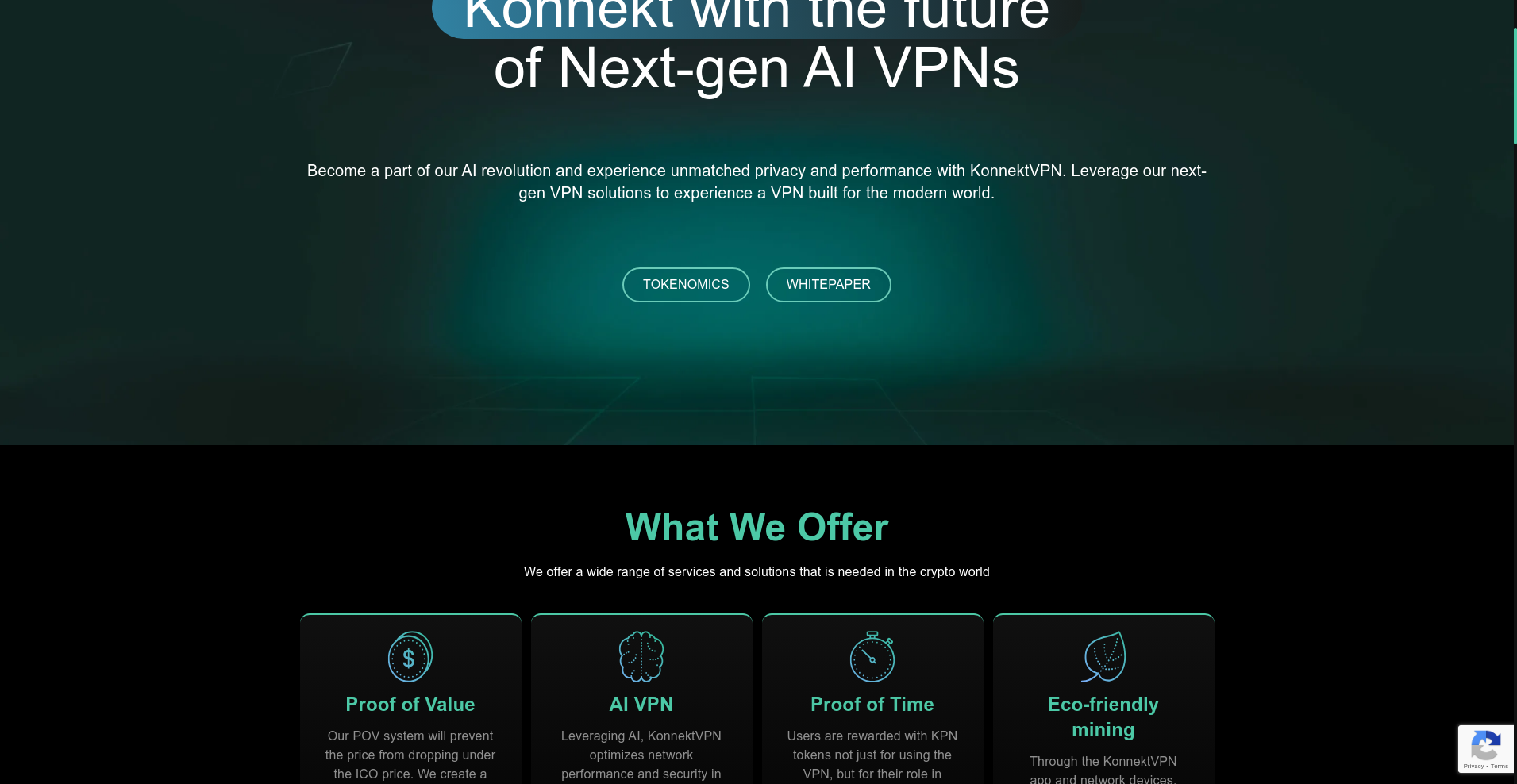KonnektVPN ($KPN) Review: A Data-Driven Legitimacy and Risk Assessment

Project Overview: Understanding KonnektVPN
KonnektVPN positions itself as an innovative, AI-powered digital security platform with a blockchain-enabled ecosystem centered around its native token, $KPN. The project claims to combine the functionality of a next-generation VPN with tokenomics mechanisms designed to incentivize user participation through mining, staking, and levels-based rewards. Its core proposition emphasizes enhanced privacy, real-time AI-driven optimization, and eco-friendly token mining, aiming to serve both casual users seeking secure browsing and crypto-savy investors interested in passive income opportunities.
This review provides an impartial analysis of the project's purported strengths and weaknesses based on available data. It explores technical architecture, team credibility, tokenomics, security evaluations, legal frameworks, and the underlying economic sustainability of the platform.
The Team and Roadmap Evaluation
From the available information, explicit details about the core development team remain opaque. There is no public disclosure of founders, advisors, or technical staff, which introduces a degree of opacity that is common in emerging crypto projects but can hinder trust. The project references transparency measures like KYC (Know Your Customer) processes and a series of legal policies, but lacks clarified credentials or prior experience claims by specific individuals. Such gaps warrant cautious scrutiny from potential investors or users, as team transparency is crucial.
Evaluating their roadmap reveals ambitious milestones around the deployment of AI VPN functionalities, tokenomics mechanics, hardware Miners, and levels-based passive income. However, specific delivery timelines, technical proof points (such as security audits), or deployment stages are unspecified, indicating a nascent or developing project trajectory. The listed milestones serve more as aspirational targets rather than concrete deliverables at present.
- Absence of publicly verified team backgrounds or prior project achievements.
- Roadmap stages are aspirational; no detailed timelines or KPIs are available.
- Potential for delays or scope changes due to early-stage development.
While the project’s vision aligns with current trends in AI and blockchain, the team’s capacity to deliver remains an open question without further disclosures or verified credentials.
KonnektVPN Security Audit Results
Based on Cyberscope's audit report, which is the only publicly available security assessment, KonnektVPN received a high security score of 95.78%, placing it in the top percentile. This indicates that at least on paper, the platform has undergone a structured security review with positive findings. Understanding how to analyze these cybersecurity audits is vital for assessing project legitimacy.
- Audit assessed web application security, including authentication, data handling, and network defenses.
- No critical vulnerabilities or common exploits (e.g., reentrancy, overflow) were explicitly reported.
- Some minor issues or areas for improvement might exist but are not detailed beyond a high score.
- Like many early-stage projects, the audit scope seems concentrated on the web app and frontend components; deeper protocols, smart contracts, or hardware security are not explicitly covered in the publicly available report.
This isolated audit suggests an adequate baseline security posture but does not replace comprehensive, ongoing security evaluations or third-party audits of the entire ecosystem, including smart contracts or AI components. As such, potential investors should treat the high score as encouraging but not conclusive proof of security, especially in the absence of disclosed audit artifacts or independent reviews. It is always advisable to verify smart contract audits thoroughly.
Tokenomics Breakdown: Analyzing $KPN
The $KPN token operates as a core economic element within the KonnektVPN ecosystem. Its design appears to incorporate mechanisms for price stabilization, rewards, and governance, but explicit details about total supply, distribution, or vesting are limited in the source data. Based on available projections, key points include:
- Total Supply: 3,000,000,000 KPN tokens.
- Allocation: 80% to miners (for minting/burning), 10% to liquidity pools, 5% to Synthia Group, 2% for advisors, 3% for ICO rounds.
- Mining & Rewards: Miners can mint up to 3% annually; rewards are distributed in $KPN, with an emphasis on environmentally friendly staking and AI training incentives.
- Vesting & Distribution: Synthia’s allocation (5%) vests over five years, with a 6-month cliff for a portion. Advisors receive semi-annual distributions. ICO investors’ tokens vest over five months, with unsold tokens burnt and re-minted for ecosystem support.
- Use Cases: While primarily used for staking, rewards, and pipeline finance, the project highlights a side claim of stability via “Proof of Value” mechanics, purportedly to support a minimum token price during volatile conditions. Exact utility details remain ambiguous, but understanding the tokenomics of $KPN is key.
Economic Viability and Risks
The tokenomics strives for long-term sustainability through mint/burn controls, layered vesting, and reward incentives. However, reliance on a DAO-like Levels system locked in smart contracts, combined with large miner-controlled supply, could pose risks of centralization or supply shocks if not carefully managed. Additionally, the absence of detailed economic modeling leaves questions about how effectively the scheme can prevent inflationary pressures or token devaluation over time. The use of hardware Miners adds another layer of complexity to this economic model.
Assessing Ecosystem Development Activity
The project exhibits active development indicators such as recent on-chain audits, security assessments, and the release of detailed tokenomics documentation. Public communications on social media (e.g., Twitter) show consistent activity, with community engagement metrics like follower count (~7,000 followers) and some interaction on Telegram. However, tangible user engagement (such as active staking, deployments, or app downloads) remains unverified or unreported, suggesting the community and ecosystem are still in early phases.
Genuine development progress appears to be underway, but large-scale adoption or real-world deployment of hardware (Miners), app features, and blockchain integrations will be key milestones to confirm the platform’s long-term viability.
Reviewing the Terms and Conditions
The legal documentation provided by KonnektVPN covers comprehensive terms of sale, affiliate agreements, ICO participation, privacy policies, and user conduct. Notably:
- The Terms specify a strict “All Sales Are Final” policy, with limited provisions for damaged-on-arrival claims, creating potential ambiguities around refunds.
- They enforce strict liability caps—liability is limited to the price paid for the product or token involved, with broad exclusions for consequential damages.
- The Terms govern jurisdiction under Delaware law, typical for U.S.-based blockchain and fintech entities, but may raise jurisdictional challenges for international users.
- Data privacy and user conduct clauses require compliance with GDPR and other laws, but the specifics about user data collection—especially related to AI training—must be examined closely before onboarding. The implications of AI integration in DeFi are often complex.
- Documentation includes references to multiple interconnected policies, suggestive of a structured legal framework but also complex enough to require careful review for red flags or compliance gaps.
Overall, the legal framework appears standard but should be independently verified for enforceability, clarity, and compliance, particularly around refund conditions and data handling.
Final Analysis: The Investment and Security Outlook for KonnektVPN
KonnektVPN presents a bold combination of AI, blockchain, and privacy technology. It claims to launch an ecosystem that blends secure VPN services with token incentives, hardware Miners, and sophisticated smart-contract-based levels. Its high security score from Cyberscope and detailed tokenomics suggest a degree of technical and financial engineering sophistication.
However, key risks remain:
- The lack of public team disclosures and detailed development milestones raises concerns about accountability and delivery capability. Transparent teams foster greater trust.
- Tokenomics details are limited; without clear utility, liquidity, and governance mechanisms, investor confidence could be challenged. A deep dive into $KPN's tokenomics is essential.
- The legal and compliance posture must be scrutinized, especially regarding international regulations, KYC/AML, and data privacy implications stemming from AI training data collection.
- While security scores are promising, comprehensive, ongoing audits of smart contracts, hardware components, and AI infrastructure are necessary before full trust can be placed. Understanding high criticality issues in audits is crucial for due diligence.
In summary, the project shows promise in innovation but is currently at an early, high-uncertainty stage. Its success will hinge on transparent execution, credible development, and adherence to regulatory standards—a landscape that deserves active monitoring by prospective users and investors alike.
As always, diligent due diligence and a cautious approach are advised when evaluating projects with nascent disclosures and complex technical components such as KonnektVPN.

Michael Brown
Head of Protocol Security & Audits
Systems engineer applying mission-critical principles to DeFi. I stress-test smart contracts and economic models to find the breaking points before they find your wallet.
Similar Projects
-
Thesirion
Thesirion Review: Scam or Legit Crypto? Find Out Now
-
Gorganus
Review of Gorganus: Crypto Project Scam Checker & DeFi Scam Review
-
NFT-MAKER
NFT-MAKER ($NMKR) Review: Risks and Opportunities in Its Ecosystem
-
The Emperor Penguin
The Emperor Penguin ($TEP) Review: Data-Driven Analysis of Risks & Legitimacy